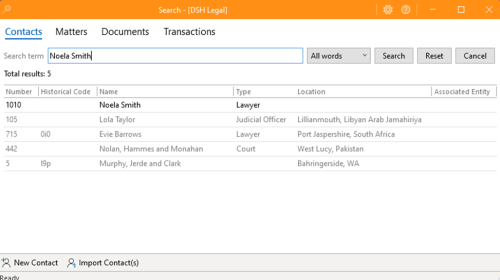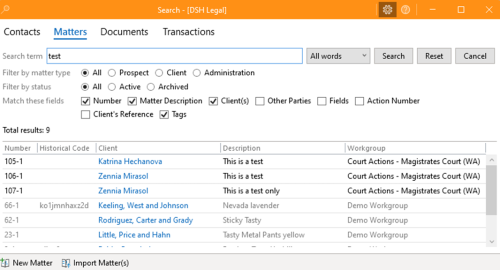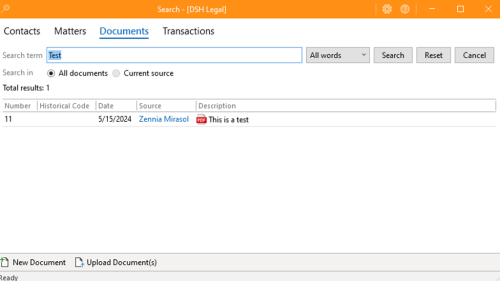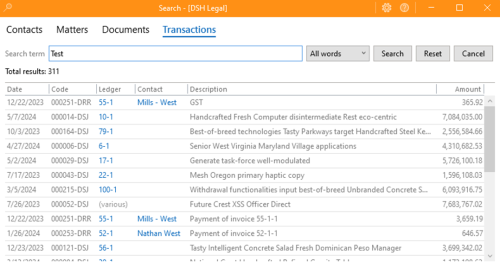Search: Difference between revisions
(removed abr search) |
(Remove outdated content, apply style guide) |
||
| Line 1: | Line 1: | ||
The ''' | The '''search''' is located centrally within the [[Desktop App]] and provides quick access to [[Contact|contacts]], [[Matter|matters]], [[Document|documents]] and [[Transaction|transactions]]. It is also the entry point for contact creation. | ||
The search plays an important role in locating records for the purpose of linkage. For example; when a contact must be added to a document, matter or other resource, the user clicks the empty "''Add contact''" hyperlink and is immediately taken to the search window. Upon locating (or creating) the desired contact, the search populates the empty hyperlink with a reference to the chosen contact. | |||
The search window displays different options depending on which mode is selected. | The search window displays different options depending on which mode is selected. | ||
===The following modes are available:=== | |||
=== The following modes are available: === | |||
* Contacts | * Contacts | ||
* Matters | *Matters | ||
* Documents | *Documents | ||
* Transactions | *Transactions | ||
== | ==Contacts== | ||
The contact search is at the center of ContactsLaw, appearing whenever details about a person or business are required in any capacity. As with other types of searches, the [[Desktop App]] opens the contact search when a contact is required for a particular hyperlink, or it can be accessed at any point in time by clicking the prominent ''Search'' button at the top of the main window. | |||
[[File:Contact Search.png|none|thumb|500x500px|The contact search.]] | |||
*'''Search term''' - One or more keywords that in some way describe the contact(s) you are searching for. These will be matched against a selection of fields (name, address, etc). You can determine whether to match all words in the search term, or any word.
| |||
*'''Advanced search''' - This is opened by clicking the cog icon in the top right of the search window. It allows you to further refine your search based on the follow advanced criteria:
| |||
**'''Contact type''' - you can restrict your search to either Individuals or Entities. | |||
** '''Fields''' - Determines which fields the keywords in the search term will be matched against. This enables you to, for example, search for all contacts on a particular street. | |||
*'''Search results''' - After the search is complete, contains the contact(s) that matched the search criteria. Simple summary details are displayed, with entities being marked in bold. The results are listed in order of rank/relevance, best match first. You can navigate between multiple pages of results.
| |||
*'''Contact creation''' - The contact search is the entry point into contact creation. Once the search has completed, the option to create or import a contact becomes available. | |||
=== | ===Search term=== | ||
By default, the search will return partial and exact matches if they contain all of the words in the search term. You can change the match type to "any words" if the contact(s) you are looking for might not contain all of the words in the search term. | |||
=== | ===Similar-sounding results=== | ||
Search results may contain similar-sounding results, shown in grey text. For example, if you search for "Smith" you may also get results containing "Schmidt". | |||
== | ==Matters== | ||
ContactsLaw includes a sophisticated Matter search, which serves as the entry point for locating all active and archived matters in the system. Upon switching the Contact search to 'Matter' mode, a series of search criteria will appear. You can list matters where your search term matches information about the matter or any of its associated contacts. As with the contact search, you can restrict/expand your search by matching 'all words' or 'any words'. | |||
As with the contact search, you can restrict/expand your search by matching 'all words' or 'any words'. | [[File:Search Matters.png|none|thumb|500x500px|The matter search.]] | ||
[[File:Search Matters.png|none|thumb|500x500px]] | |||
=== | ===Advanced Search criteria=== | ||
You can toggle this by clicking the | You can toggle this by clicking the cog icon in the top right hand corner of the window, which the displays the following settings: | ||
* '''Matter type''' - restrict your search to Prospect, Client and Administration matters. | *'''Matter type''' - restrict your search to Prospect, Client and Administration matters. | ||
* '''Status''' - restrict your search to Active and Archived matters | *'''Status''' - restrict your search to Active and Archived matters | ||
* '''Match these fields''' - restrict your word search to match only against the fields you select. | * '''Match these fields''' - restrict your word search to match only against the fields you select. | ||
== | ==Documents== | ||
The document search allows you to quickly and easily locate any document within ContactsLaw. As with the contact search, you enter a search term that is matched against the set of fields you specify; for example, the description of the document. | The document search allows you to quickly and easily locate any document within ContactsLaw. As with the contact search, you enter a search term that is matched against the set of fields you specify; for example, the description of the document. | ||
[[File:Document Search.png|none|thumb|500x500px]] | [[File:Document Search.png|none|thumb|500x500px]] | ||
=== | ===Search term and match type=== | ||
Type your search term into the box. If you type two or more words, you can decide whether you want documents that match '''all words''' or documents that match '''any word''' in the box. | Type your search term into the box. If you type two or more words, you can decide whether you want documents that match '''all words''' or documents that match '''any word''' in the box. | ||
===Search criteria === | |||
*'''Fields''' - Select the fields you want to search in. The document description is the most common (and fastest) field to search in. You can also type all or part of a contact's name and match documents who are associated with a particular contact. | |||
*'''Date''' - You can restrict the search to a specific date range. | |||
* '''Date''' | |||
You can restrict the search to a specific date range | |||
=== | ===Search results=== | ||
The results of the search appear in the list below the search criteria. Results are ranked and ordered according to relevance, with the best match at the top of the list. | |||
==Transactions == | |||
ContactsLaw provides a transaction search, which allows you to quickly locate general/trust transactions. Your search term can match a range of transaction properties.[[File:Transaction Search.png|none|thumb|500x500px|The transaction search.]] | |||
[[Category:Desktop]] | |||
Revision as of 17:10, 5 June 2024
The search is located centrally within the Desktop App and provides quick access to contacts, matters, documents and transactions. It is also the entry point for contact creation.
The search plays an important role in locating records for the purpose of linkage. For example; when a contact must be added to a document, matter or other resource, the user clicks the empty "Add contact" hyperlink and is immediately taken to the search window. Upon locating (or creating) the desired contact, the search populates the empty hyperlink with a reference to the chosen contact.
The search window displays different options depending on which mode is selected.
The following modes are available:
- Contacts
- Matters
- Documents
- Transactions
Contacts
The contact search is at the center of ContactsLaw, appearing whenever details about a person or business are required in any capacity. As with other types of searches, the Desktop App opens the contact search when a contact is required for a particular hyperlink, or it can be accessed at any point in time by clicking the prominent Search button at the top of the main window.
- Search term - One or more keywords that in some way describe the contact(s) you are searching for. These will be matched against a selection of fields (name, address, etc). You can determine whether to match all words in the search term, or any word.
- Advanced search - This is opened by clicking the cog icon in the top right of the search window. It allows you to further refine your search based on the follow advanced criteria:
- Contact type - you can restrict your search to either Individuals or Entities.
- Fields - Determines which fields the keywords in the search term will be matched against. This enables you to, for example, search for all contacts on a particular street.
- Search results - After the search is complete, contains the contact(s) that matched the search criteria. Simple summary details are displayed, with entities being marked in bold. The results are listed in order of rank/relevance, best match first. You can navigate between multiple pages of results.
- Contact creation - The contact search is the entry point into contact creation. Once the search has completed, the option to create or import a contact becomes available.
Search term
By default, the search will return partial and exact matches if they contain all of the words in the search term. You can change the match type to "any words" if the contact(s) you are looking for might not contain all of the words in the search term.
Similar-sounding results
Search results may contain similar-sounding results, shown in grey text. For example, if you search for "Smith" you may also get results containing "Schmidt".
Matters
ContactsLaw includes a sophisticated Matter search, which serves as the entry point for locating all active and archived matters in the system. Upon switching the Contact search to 'Matter' mode, a series of search criteria will appear. You can list matters where your search term matches information about the matter or any of its associated contacts. As with the contact search, you can restrict/expand your search by matching 'all words' or 'any words'.
Advanced Search criteria
You can toggle this by clicking the cog icon in the top right hand corner of the window, which the displays the following settings:
- Matter type - restrict your search to Prospect, Client and Administration matters.
- Status - restrict your search to Active and Archived matters
- Match these fields - restrict your word search to match only against the fields you select.
Documents
The document search allows you to quickly and easily locate any document within ContactsLaw. As with the contact search, you enter a search term that is matched against the set of fields you specify; for example, the description of the document.
Search term and match type
Type your search term into the box. If you type two or more words, you can decide whether you want documents that match all words or documents that match any word in the box.
Search criteria
- Fields - Select the fields you want to search in. The document description is the most common (and fastest) field to search in. You can also type all or part of a contact's name and match documents who are associated with a particular contact.
- Date - You can restrict the search to a specific date range.
Search results
The results of the search appear in the list below the search criteria. Results are ranked and ordered according to relevance, with the best match at the top of the list.
Transactions
ContactsLaw provides a transaction search, which allows you to quickly locate general/trust transactions. Your search term can match a range of transaction properties.





